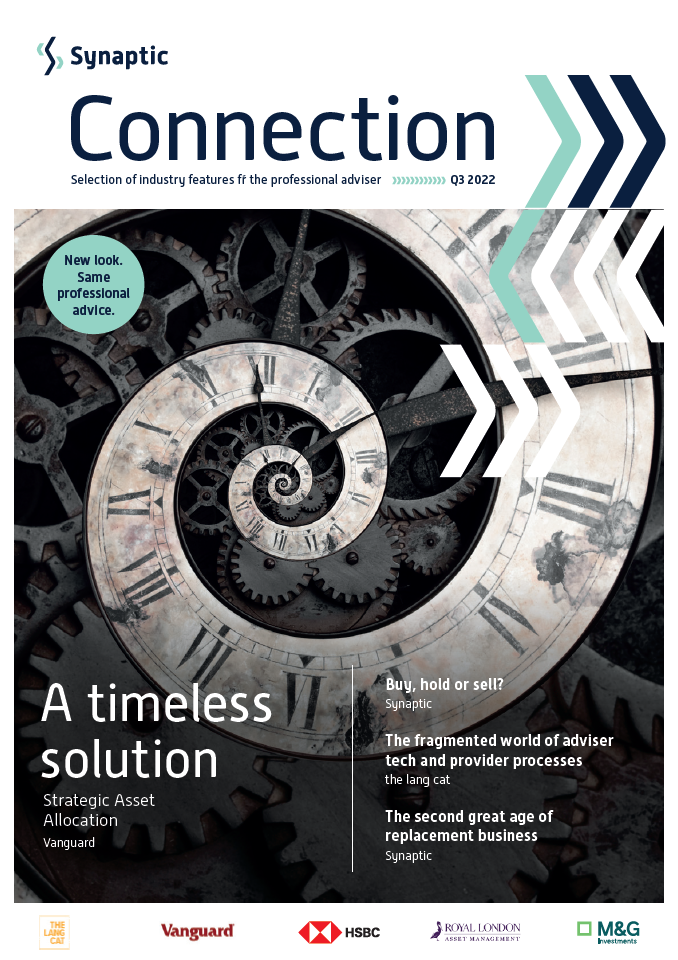In this edition...
- Strategic Asset Allocation: A timeless solution Vanguard,
- The second great age of replacement business Eric Armstrong, Client Director - Synaptic
- The fragmented world of adviser tech and provider processes Natalie Holt, Content Editor - the lang cat
- Will the Consumer Duty make your CIP obsolete Antony Champion, Head of Intermediaries - Brewin Dolphin
- Einstein, Benjamin Graham and Napoleon David Macfarlane, Team Head, Discretionary Wealth Management - HSBC Asset Management
- How IFAs can unlock a smooth ride Marc O’Sullivan, Head of Investments - Wesleyan
- Reliance on others Tim Cooper, Freelance Journalist on behalf of EBI
- Boom-bust economics is back! Be warned… John Pattullo, Co-Head of Strategic Fixed Income - Janus Henderson Investors
- Through a glass, darkly Guy Monson, Senior Partner and Chief Market Strategist - Sarasin & Partners
- Diversified income fund and impact Close Brothers , Asset Management
- Sustainable futures Mike Fox, Head of Sustainable Investments - Royal London Asset Management
- Morningstar Wealth Platform: now the real work gets underway Mark Sanderson, Director - Morningstar Wealth Platform
- A new capitalism Seeking value in Japanese equities M&G Investments,
- Is it the end of an era for the UK property market Andrew Robinson, Senior Investment Analyst - RSMR
- Buy, hold or sell? Either way, you need research to evidence your decision John Warby, Business Development Manager - Synaptic
 Many discretionary managers fail to respond to warnings on ‘agent as client’ contracts. ebi experience shows 90% of advisers would take PFS advice to adopt less risky ‘reliance on others’ contracts if they could.
Many discretionary managers fail to respond to warnings on ‘agent as client’ contracts. ebi experience shows 90% of advisers would take PFS advice to adopt less risky ‘reliance on others’ contracts if they could.
Many discretionary managers have yet to offer ‘reliance on others’ (ROO) contracts as a replacement for traditional ‘agent as client’ arrangements. This is despite the Professional Finance Society (PFS) warning about risks in the latter and urging advisers to switch to ROO three years ago.
Based on ebi’s experience, most advisers make the switch if they can. ebi introduced ROO contracts in January 2022 to help member advisers de-risk their businesses, and so far 90% of those who have joined or reviewed their options have adopted the new arrangements.
Harry Hitchcock, chief operating officer at ebi, said: ‘We introduced ROO because the advisers in our network had been feeling the burden of increasing professional indemnity insurance costs; and noticing the added investor protection ROO contracts can bring.’
Most advisers can see ROO contracts give a better outcome for them and their clients. The only concern tends to be the potential additional paperwork involved. But advisers adopting ROO have found this is minimal, with only one extra form for investors to sign.
Nick Walker, head of client relations at ebi, said: ‘Our integrated approach means paperwork doesn’t cause stumbling blocks. There is some extra administration for ebi, but it slots well into existing workflows.
‘All costs, practical relationships and workflows stay the same. All 18 platforms ebi work with have no issue accepting ROO contracts, with very little changing operationally. Now the ROO process is ironed out, there is little debate left between ROO and AAC.’
EBI engaged with lawyers and contractual experts for over a year to ensure advisers who choose ROO contracts get the best from them.
‘There is a lot of legwork involved in setting up these arrangements for discretionary managers, but it was worth the sizeable investment to produce a better outcome for advisers and investors,’ said Hitchcock. ‘Few other DIMs have gone to the same lengths to implement this service, instead continuing to only offer their incumbent AAC option.’
Comparing AAC and ROO
AACs and ROOs describe different ways an adviser firm can work with a discretionary investment manager (DIM) to provide investment services to the end client.
Advisers are increasingly using DIMs, and, until recently, most did this on an agent as client (AAC) basis. But advisers have become wary of AACs since 2019, when the PFS highlighted several risks in the way these contracts were used.
These risks can be reflected in higher professional indemnity insurance costs. ROO contracts can help reduce these risks and PI costs by allowing clients to take complaints against discretionary managers to the Financial Ombudsman Service (FOS). This protects advisers from getting taken to FOS by clients who have a complaint against the manager.
The PFS also said confusing nuances around who is the client in an AAC format can have significant implications for advisers.
They must consider these issues carefully as a core element of due diligence, it said.
Why discretionary managers use AAC
Many DIMs have continued to use AAC rules because advisers asked for them, believing they helped avoid managers poaching clients.
Some claim AAC contracts also suit DIMs as they gain the assets without bearing responsibility should anything go wrong.
AAC contracts are not necessarily unfair and can work if the arrangements are documented clearly, and all parties understand their rights and obligations. Some believe AAC can work well where the adviser has express authority from the client. If you still want to use AAC, your client agreement should clarify, among other things, your appointment as agent; your authority to appoint the DIM; and compensation avenues for complaints.
"The ROO regime more accurately reflects the nature of the relationship between ourselves, ebi and the clients. The ROO investment management agreement sets out clearly the responsibilities and obligations of each party."
Why use ROO instead?
The PFS urged advisers to consider ‘reliance on others’ as an alternative to AAC. With ROO, client agreements do not need to address the specific issues around agency.
Neil Rossiter, managing director of Blackdown Financial, said: ‘Based on the PFS paper, we believe PI insurers will likely look more favourably on ROO. For new clients, there are no cons I can see to adopting ROO. For existing clients, there is the explanation of the differences between ROO and AAC and why we recommend ROO now.’
Steve Perera, founder of Britannic Place, adds: ‘The benefits of ROO for our clients are better regulatory protection and the ability to complain direct to ebi in the unlikely event of a problem. Also PI insurers have asked us about AAC and we hope moving to ROO will improve our premiums.’
Mark Thornton-Smith, chartered financial planner, Wishart Wealth, agrees: ‘The ROO regime more accurately reflects the nature of the relationship between ourselves, ebi and the clients. The ROO investment management agreement sets out clearly the responsibilities and obligations of each party.
‘Under the AAC structure, we were preventing our clients from being able to seek recourse to FOS, which we and our insurers felt uncomfortable about.
‘We believe it clarifies the different pieces of the advice puzzle - adviser, platform, investment solution - now clients are signing an agreement and becoming clients of ebi directly.’
Within ROO, you can still use the DIM to provide consistent investment outcomes efficiently and cost-effectively, and operate in an advisory capacity with your current terms and conditions.
With ROO, you should ensure strong communication between your firm and the DIM at outset as both have a legal and regulatory responsibility to the end client.
Contrary to what some believe, you can still protect your clients from poaching within ROO. DIM personnel should never meet the client unless you request it, and your intermediary agreement should confirm the sanctity of your client base.
How ROO works at ebi
As a discretionary manager, ebi offers ROO and AAC contracts. To find out more about how both work for ebi members and the pros and cons of each, visit www.ebi.co.uk/the-benefits-of-reliance-on-others/
Under ROO, the adviser remains central to the relationship. You handle client discussions and ebi relies on information from you, rather than dealing directly with the client.
Advisers should weigh the pros and cons, and think through the implications for their business carefully before choosing.
But ebi’s recent experience shows most advisers’ priority now is to de-risk their business and lessen their PI bills, and ROO enables you to do that.
Get in touch
www.ebi.co.uk
+44 (0) 1922 472226
enquiries@ebi.co.uk
Twitter - EBIPortfolios
LinkedIn - ebi-portfolios-ltd-
Sign up for updates
Keep up to speed with everything you need to know each quarter, by email or post.


